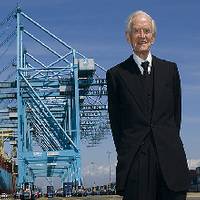Long Beach Port Celebrates Environmental Successes
Shipping lines, environmental organizations, trucking companies, terminal operators and a railroad were honored today, July 29, by Long Beach Mayor Dr. Robert Garcia and the Port of Long Beach at the annual Environmental Achievement Awards. The awards are an outgrowth of the groundbreaking Green Port Policy, the Port’s commitment to improving the environment. Approved in 2005 by the Long Beach Board of Harbor Commissioners, the policy put the Port on the path to become a world leader in environmental stewardship. At today’s event, Mayor Garcia introduced the “Mayor’s Green Port Award,” which was presented to terminal operator Long Beach Container Terminal.
Maersk Line Celebrates 5th Anniversary of Fuel Switch

Charlotte, North Carolina (March 31, 2011) – On March 31, 2006, Maersk Line’s SINE MÆRSK changed the course of low-sulfur distillate fuel use when she called Los Angeles. Five years later, this fuel switch has resulted in a 3700 ton savings in air emissions benefitting those who live and work in California. A 4100 ton savings in air emissions has been made in North America with vessels calling California, Tacoma, Seattle, Vancouver and Houston. There has been a 95% reduction of sulfur oxides (SOx)…
NRDC Says Ports Are Largest Urban Polluters
U.S. seaports are the largest and most poorly regulated sources of urban pollution in the country, according to a report released by NRDC (Natural Resources Defense Council) and the Coalition for Clean Air. Harboring Pollution: The Dirty Truth about U.S. Ports grades the ten biggest seaports for their impact on air and water quality, land use, and nearby communities. The report finds that despite the availability of technology to cut pollution, major seaports are emitting ever-larger amounts of toxic diesel exhaust and other contaminants that damage public health, disrupt local communities and harm marine habitats. With cargo volume at some ports expected to triple in the next twenty years, the report urges quick action by port operators and policy-makers to implement cleaner practices.





